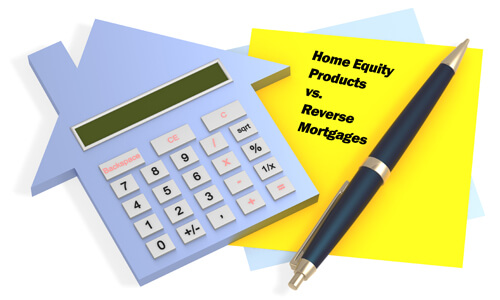If you’re a homeowner who needs to finance a big-ticket purchase like a home remodel, or if you just need extra cash to pay off some of your expenses, you can borrow money against the equity you’ve built in your home to achieve your goal.
Two ways you can do this are by opening a Home Equity Line of Credit (HELOC) or a Home Equity Loan. Both HELOCs and Home Equity Loans are sometimes called “second mortgages” because they are both secured by your home, just like your initial mortgage.
You can determine your home equity by subtracting the amount you still owe on your mortgage from the total value of your home. For example, if your home is worth $400,000 and you’ve paid off $200,000, you would have $200,000 in equity. If you qualify for either a HELOC or a Home Equity Loan, most lenders will let you borrow 80-90% of your home equity, depending on your credit history.
If you’re trying to decide between a HELOC and a Home Equity Loan, use this guide to determine which makes the most sense for your situation.
What to Know before You Decide
Before making a decision, you should note that HELOCs and Home Equity Loans are secured by your home, so if you fail to pay off the balance, the lender can foreclose on your property.
HELOCs and Home Equity Loans may be similar, but they serve different purposes. Before deciding on which one you’ll go with, consider the following for each loan type:
- How much money do you need?
- What do you need the money for?
- Will I need this money over the long term, or for a short-term expense?
- What are the interest rates on each loan?
- What are the appraisal and closing fees?
- What will the monthly payment be?
- Are there any tax advantages for choosing one or the other?
With these answers in mind, you’ll be much better equipped to decide which option is best for you.
When You Should Consider a HELOC
A HELOC is very similar to a credit card or any other revolving line of credit. In this case, your equity acts as a line of credit, so you have a set amount available to borrow against at any given time, which will have to be paid back at monthly intervals. You pay off the principal, and the revolving nature of the credit means you can use it again.
So, if you have a $50,000 HELOC, and you borrow $10,000 of it in a certain month, but pay back $5,000, you will have $45,000 available to you.
It’s very important that you pay attention to the terms of credit. Your minimum monthly payment can fluctuate depending on how much you borrow in a given month. There may also be a variable interest rate, but in most cases you won’t pay interest until you actually use the credit. Additionally, a HELOC usually has a fixed end date. Your lender may not allow you to renew your line of credit, and you’ll be expected to pay off the remaining balance.
In some cases, lenders will let you pay interest-only for an initial period, which will result in lower payments for that time. Often, the interest is tax deductible for loans up to $100,000. Again, it’s critical that you understand the terms of a HELOC fully before you decide.
When you should open a HELOC:
A HELOC is a great option if you need access to cash over a long period of time. If you have to pay off a child’s college tuition at the beginning of every semester, need help covering an unexpected medical expense or simply have bills that you need to pay off in a short amount of time, a HELOC will give you access to the cash you need.
When You Should Take Out a Fixed Home Equity Loan
Home Equity Loans are very straightforward; they function almost exactly like a typical fixed-rate mortgage. You take out the loan as a lump sum and pay the principal and interest back in fixed monthly installments, with a fixed interest rate.
In general, the interest rates for a Home Equity Loan are higher than a HELOC because you have the predictability of a fixed-interest payment. As with the HELOC, the interest you pay on a Home Equity Loan is usually tax deductible for loans up to $100,000. These loans are usually fully amortized, and there typically aren’t any exotic features with them like interest-only payments.
Unlike a HELOC, once you take out the loan, you usually cannot take out any more money.
When you should take out a Home Equity Loan:
Home Equity Loans are a great choice if you have some predictable big-ticket expenses coming your way, like a wedding, an automobile purchase or a major home remodel. It’s also a great way to consolidate debt: If you’re carrying a balance on a few credit cards, you can take out a Home Equity Loan, pay off all of your cards and pay the bank back at a lower rate of interest than you may be paying for your credit cards.
A Home Equity Loan is also helpful for people on fixed incomes, as the payments are very predictable and won’t fluctuate month-to-month. Essentially, if you know exactly how much you need and you’re sure you won’t need to borrow any more, a Home Equity Loan makes the most sense.
HELOCs and Home Equity Loans can be the boost you need to take care of expenses both large and small. Regardless of which option you choose, however, you should always do your research to determine your best choice and have a clear plan in place for paying off the loans.





Comments Section
Please note: Comments are not monitored for member servicing inquiries and will not be published. If you have a question or comment about a Quorum product or account, please visit quorumfcu.org to submit a query with our Member Service Team. Thank you.